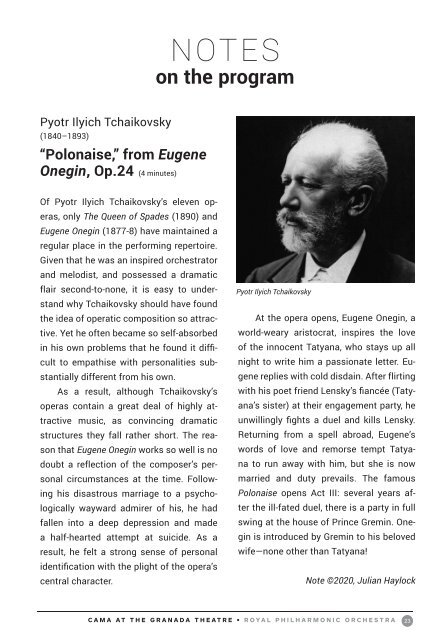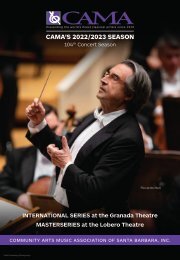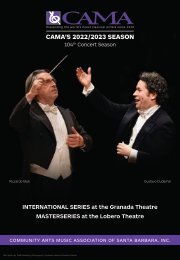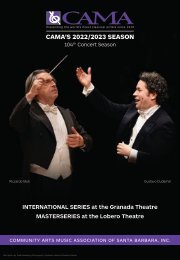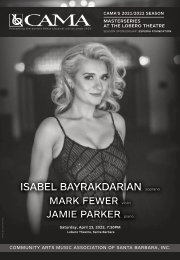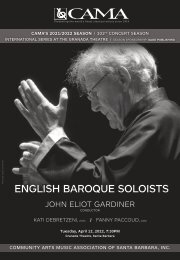Monday, January 27, 2020—CAMA Presents the Royal Philharmonic Orchestra with Pinchas Zukerman—International Series at The Granada Theatre, Santa Barbara
MONDAY, JANUARY 27, 2020, 8:00PM / CAMA Presents the Royal Philharmonic Orchestra / Pinchas Zukerman, conductor and violin soloist / CAMA’s International Series rings in 2020 with the welcome return of London’s ever-popular Royal Philharmonic Orchestra. Formed in 1946 by Sir Thomas Beecham, it has been at the forefront of music-making in Britain for over seven decades, recognized worldwide as one of the United Kingdom’s most prodigious orchestras. In 1966, Queen Elizabeth conferred the title of “Royal” unconditionally on the orchestra. In its self-appointed role as Britain’s national orchestra, the RPO has toured in more than thirty countries across the globe, as well as performing annual concert series at both London’s Royal Festival Hall and Royal Albert Hall. In a career spanning five decades, Pinchas Zukerman (Principal Guest Conductor of the RPO) is universally respected as a virtuoso violinist, violist, conductor and chamber musician with over 100 recordings released to date earning 21 Grammy® nominations. / PROGRAM: TCHAIKOVSKY: “Polonaise” from Eugene Onegin / MOZART: Violin Concerto No.5 in A major, K.219, “Turkish” / TCHAIKOVSKY: Symphony No.5 in E minor, Op.64
MONDAY, JANUARY 27, 2020, 8:00PM / CAMA Presents the Royal Philharmonic Orchestra / Pinchas Zukerman, conductor and violin soloist / CAMA’s International Series rings in 2020 with the welcome return of London’s ever-popular Royal Philharmonic Orchestra. Formed in 1946 by Sir Thomas Beecham, it has been at the forefront of music-making in Britain for over seven decades, recognized worldwide as one of the United Kingdom’s most prodigious orchestras. In 1966, Queen Elizabeth conferred the title of “Royal” unconditionally on the orchestra. In its self-appointed role as Britain’s national orchestra, the RPO has toured in more than thirty countries across the globe, as well as performing annual concert series at both London’s Royal Festival Hall and Royal Albert Hall. In a career spanning five decades, Pinchas Zukerman (Principal Guest Conductor of the RPO) is universally respected as a virtuoso violinist, violist, conductor and chamber musician with over 100 recordings released to date earning 21 Grammy® nominations. / PROGRAM:
TCHAIKOVSKY: “Polonaise” from Eugene Onegin / MOZART: Violin Concerto No.5 in A major, K.219, “Turkish” / TCHAIKOVSKY: Symphony No.5 in E minor, Op.64
Create successful ePaper yourself
Turn your PDF publications into a flip-book with our unique Google optimized e-Paper software.
NOTES<br />
on <strong>the</strong> program<br />
Pyotr Ilyich Tchaikovsky<br />
(1840–1893)<br />
“Polonaise,” from Eugene<br />
Onegin, Op.24 (4 minutes)<br />
Of Pyotr Ilyich Tchaikovsky’s eleven operas,<br />
only <strong>The</strong> Queen of Spades (1890) and<br />
Eugene Onegin (1877-8) have maintained a<br />
regular place in <strong>the</strong> performing repertoire.<br />
Given th<strong>at</strong> he was an inspired orchestr<strong>at</strong>or<br />
and melodist, and possessed a dram<strong>at</strong>ic<br />
flair second-to-none, it is easy to understand<br />
why Tchaikovsky should have found<br />
<strong>the</strong> idea of oper<strong>at</strong>ic composition so <strong>at</strong>tractive.<br />
Yet he often became so self-absorbed<br />
in his own problems th<strong>at</strong> he found it difficult<br />
to emp<strong>at</strong>hise <strong>with</strong> personalities substantially<br />
different from his own.<br />
As a result, although Tchaikovsky’s<br />
operas contain a gre<strong>at</strong> deal of highly <strong>at</strong>tractive<br />
music, as convincing dram<strong>at</strong>ic<br />
structures <strong>the</strong>y fall ra<strong>the</strong>r short. <strong>The</strong> reason<br />
th<strong>at</strong> Eugene Onegin works so well is no<br />
doubt a reflection of <strong>the</strong> composer’s personal<br />
circumstances <strong>at</strong> <strong>the</strong> time. Following<br />
his disastrous marriage to a psychologically<br />
wayward admirer of his, he had<br />
fallen into a deep depression and made<br />
a half-hearted <strong>at</strong>tempt <strong>at</strong> suicide. As a<br />
result, he felt a strong sense of personal<br />
identific<strong>at</strong>ion <strong>with</strong> <strong>the</strong> plight of <strong>the</strong> opera’s<br />
central character.<br />
Pyotr Ilyich Tchaikovsky<br />
At <strong>the</strong> opera opens, Eugene Onegin, a<br />
world-weary aristocr<strong>at</strong>, inspires <strong>the</strong> love<br />
of <strong>the</strong> innocent T<strong>at</strong>yana, who stays up all<br />
night to write him a passion<strong>at</strong>e letter. Eugene<br />
replies <strong>with</strong> cold disdain. After flirting<br />
<strong>with</strong> his poet friend Lensky’s fiancée (T<strong>at</strong>yana’s<br />
sister) <strong>at</strong> <strong>the</strong>ir engagement party, he<br />
unwillingly fights a duel and kills Lensky.<br />
Returning from a spell abroad, Eugene’s<br />
words of love and remorse tempt T<strong>at</strong>yana<br />
to run away <strong>with</strong> him, but she is now<br />
married and duty prevails. <strong>The</strong> famous<br />
Polonaise opens Act III: several years after<br />
<strong>the</strong> ill-f<strong>at</strong>ed duel, <strong>the</strong>re is a party in full<br />
swing <strong>at</strong> <strong>the</strong> house of Prince Gremin. Onegin<br />
is introduced by Gremin to his beloved<br />
wife—none o<strong>the</strong>r than T<strong>at</strong>yana!<br />
Note ©2020, Julian Haylock<br />
CAMA AT THE GRANADA THEATRE • ROYAL PHILHARMONIC ORCHESTRA<br />
23


